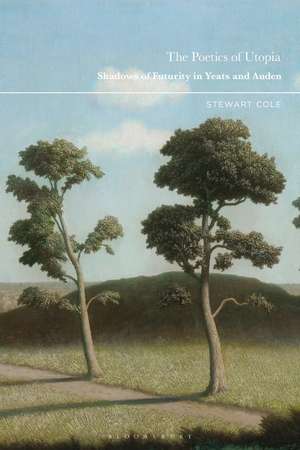The Poetics of Utopia: Shadows of Futurity in Yeats and Auden
Autor Stewart Coleen Limba Engleză Hardback – 17 mai 2023
Preț: 510.34 lei
Preț vechi: 731.17 lei
-30% Nou
Puncte Express: 766
Preț estimativ în valută:
97.66€ • 104.43$ • 81.42£
97.66€ • 104.43$ • 81.42£
Carte tipărită la comandă
Livrare economică 18 aprilie-02 mai
Preluare comenzi: 021 569.72.76
Specificații
ISBN-13: 9781350293854
ISBN-10: 1350293857
Pagini: 232
Ilustrații: 6 bw illus
Dimensiuni: 156 x 234 mm
Greutate: 0.5 kg
Editura: Bloomsbury Publishing
Colecția Bloomsbury Academic
Locul publicării:London, United Kingdom
ISBN-10: 1350293857
Pagini: 232
Ilustrații: 6 bw illus
Dimensiuni: 156 x 234 mm
Greutate: 0.5 kg
Editura: Bloomsbury Publishing
Colecția Bloomsbury Academic
Locul publicării:London, United Kingdom
Caracteristici
Emphasizes the relevance of poetry to social change by contextualizing Yeats's and Auden's utopian poetics within the broader current of 20th-century political thought
Notă biografică
Stewart Cole is Associate Professor of English and Environmental Studies at the University of Wisconsin Oshkosh, USA, where he teaches courses in modern British and Irish literature, literary criticism, and the environmental humanities. He is also the author of 2 poetry collections, Questions in Bed and Soft Power.
Cuprins
Introduction: Shadows of FuturityChapter One: "Ever new and ever ancient": The Pastoral Utopias of Early YeatsChapter Two: "History is very simple": Desire and the Meanings of Utopia in Later YeatsChapter Three: "The Good Place has not yet been": The Pursuit of Unity in Early AudenChapter Four: "The ungarnished offended gap": Utopia and Negative Poetics in Later AudenChapter Five: Draped in Black: Ekphrasis and the Ends of Utopia
Recenzii
A lucid, carefully argued and insightful reading of two of the towering figures of British poetic modernism that raises productive questions about issues rarely raised at all - most vitally about the relationship between poetics and the utopian impulse, as well as about the often conflicting and complex relationship between modernist disenchantment and utopian desire
